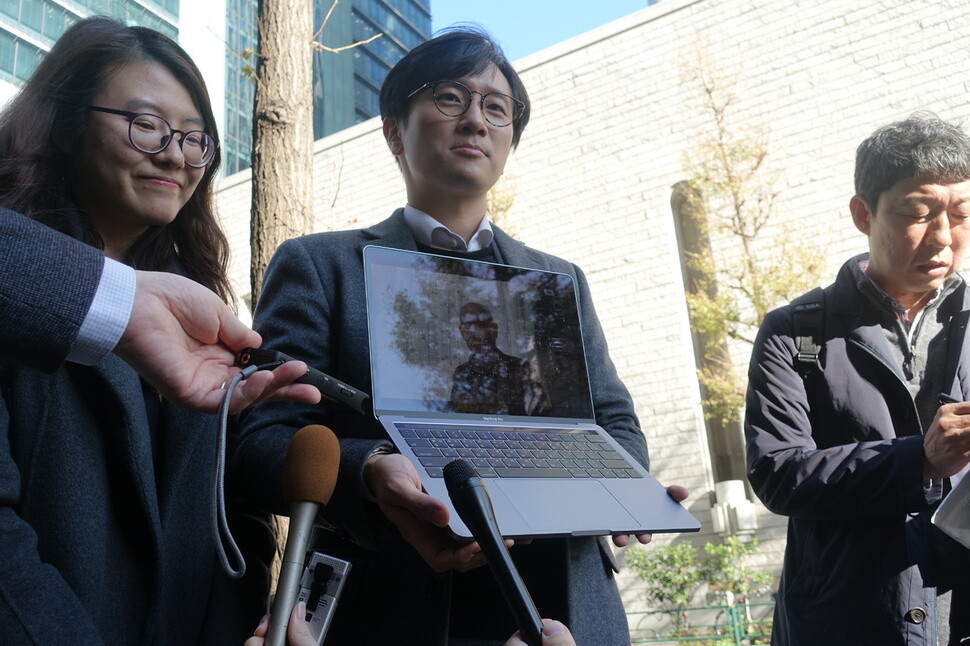hankyoreh
Links to other country sites 다른 나라 사이트 링크
Daegu District Court approves seizure of Nippon Steel’s S. Korean assets

The Pohang branch of Daegu District Court announced on Jan. 8 that it had approved the seizure of South Korean assets of the Japanese company Nippon Steel and Sumitomo Metal as requested by legal representatives of victims of forced labor by the company’s former incarnation Nippon Steel during Japan’s colonial occupation of Korea.
The decision heralds an even deeper chill to come for South Korea-Japan relations, with Tokyo previously announcing plans to begin dispute settlement procedures according to its 1965 Claims Settlement Agreement with South Korea if seizure procedures were initiated against a Japanese company.
“The request to seize PNR stocks was approved on Jan. 3, and related documents have been sent to the company as we move forward with the procedures,” an official with the Pohang branch said. The decision to order the seizure goes into effect as soon as the documents have been delivered to PNR. Once this happens, Nippon Steel will lose the right to sell, transfer, or otherwise dispose of 81,075 PNR shares as requested by the survivors’ legal representatives. PNR maintained that it had not yet received the documents.
PNR is a joint venture founded by Nippon Steel and POSCO, specializing in developing steelmaking by-products as resources. The attorneys have estimated Nippon Steel’s ownership of PNR at around 2.34 million shares (worth 11 billion won, or US$9.8 million) and requested the seizure of 81,075, an amount corresponding to the main damages and delay damages to the two survivors.
After Nippon Steel refused to pay damages despite the Supreme Court upholding the ruling last October, attorneys representing Lee Choon-sik, 95, and one other forced labor survivor applied in court on Dec. 31 for compulsory execution, demanding the seizure of Nippon Steel assets in South Korea.
Responding on Jan. 6 to the survivors initiating compulsory execution procedures to seize Nippon Steel assets in South Korea, Japanese Prime Minister Shinzo Abe called the situation “extremely dismaying,” and said he had “ordered the relevant ministries to take concrete [response] measures.”
A South Korean government official predicted that Japan would be “sending official notice shortly to request diplomatic discussions in accordance with the South Korea-Japan Claims Settlement Agreement.”
“Once we have received the notice, we plan to examine it and inform [Japan] of our position,” the official added.
The survivors’ legal representatives maintained that they “declined to request a selloff order in order to leave room for negotiation.”
By Park Min-hee and Ko Han-sol, staff reporters
Please direct comments or questions to [english@hani.co.kr]

Editorial・opinion
![[Column] Park Geun-hye déjà vu in Yoon Suk-yeol [Column] Park Geun-hye déjà vu in Yoon Suk-yeol](https://flexible.img.hani.co.kr/flexible/normal/500/300/imgdb/original/2024/0424/651713945113788.jpg) [Column] Park Geun-hye déjà vu in Yoon Suk-yeol
[Column] Park Geun-hye déjà vu in Yoon Suk-yeol![[Editorial] New weight of N. Korea’s nuclear threats makes dialogue all the more urgent [Editorial] New weight of N. Korea’s nuclear threats makes dialogue all the more urgent](https://flexible.img.hani.co.kr/flexible/normal/500/300/imgdb/original/2024/0424/7317139454662664.jpg) [Editorial] New weight of N. Korea’s nuclear threats makes dialogue all the more urgent
[Editorial] New weight of N. Korea’s nuclear threats makes dialogue all the more urgent- [Guest essay] The real reason Korea’s new right wants to dub Rhee a founding father
- [Column] ‘Choson’: Is it time we start referring to N. Korea in its own terms?
- [Editorial] Japan’s rewriting of history with Korea has gone too far
- [Column] The president’s questionable capacity for dialogue
- [Column] Are chaebol firms just pizza pies for families to divvy up as they please?
- [Column] Has Korea, too, crossed the Rubicon on China?
- [Correspondent’s column] In Japan’s alliance with US, echoes of its past alliances with UK
- [Editorial] Does Yoon think the Korean public is wrong?
Most viewed articles
- 1‘We must say no’: Seoul defense chief on Korean, USFK involvement in hypothetical Taiwan crisis
- 2N. Korean delegation’s trip to Iran shows how Pyongyang is leveraging ties with Moscow
- 3‘Weddingflation’ breaks the bank for Korean couples-to-be
- 4[Reportage] On US campuses, student risk arrest as they call for divestment from Israel
- 5Amnesty notes ‘erosion’ of freedom of expression in Korea in annual human rights report
- 6[Column] Park Geun-hye déjà vu in Yoon Suk-yeol
- 7Korea sees more deaths than births for 52nd consecutive month in February
- 8[Editorial] New weight of N. Korea’s nuclear threats makes dialogue all the more urgent
- 9Will NewJeans end up collateral damage in internal feud at K-pop juggernaut Hybe?
- 10[Guest essay] The real reason Korea’s new right wants to dub Rhee a founding father